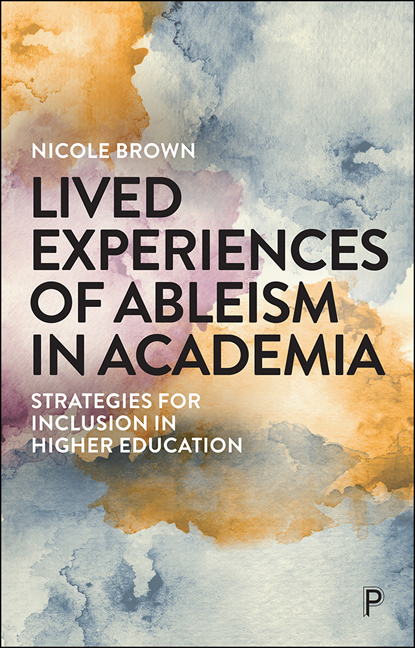1 - A leg to stand on: irony, autoethnography and ableism in the academy
Published online by Cambridge University Press: 18 December 2021
Summary
Introduction
Harsh fluorescent lights glare down on me as I enter the tiny, beige room that houses my department's photocopier. The sharp scent of hot toner wafts from the machine as it spits out page after page of what appears to be an exam. Resigned, I place my biannual, state-issued disabled parking certificate on the copier and press several buttons to scan it into an electronic image.
“Hey! How are you?” asks my colleague Ben, as he enters the room and reaches for the pile of copies on the lower tray.
I roll my eyes. “I’m okay, just scanning proof that my leg is still amputated – for next year's parking pass.”
Ben looks back at me incredulously. “Seriously?”
“Yup,” I nod. Sneering, I continue, “My leg still hasn't grown back – shocking!”
“So your permanent disability is actually permanent?” he asks with mock surprise.
“Indeed. If only I came from a family of starfish, maybe there would be hope for regenerating a leg,” I quip.
Ben shakes his head. “That's ridiculous. What a waste of your time and theirs.”
Grateful for his understanding, I say goodbye to Ben and return to my office to dutifully email the scanned certificate to the university parking office.
The demand that I repeatedly provide current documentation of my status as a disabled motorist to my university is, of course, a minor institutional barrier. The parking office's stated goal of ‘accurate and up-to-date record keeping’ requires wasting my time and theirs with bureaucratic nonsense born of an endless well of suspicion. I sarcastically refer to this policy as ‘proving that my leg still has not grown back’, following amputation above the knee due to complications of bone cancer, after almost 20 years of limb-salvaging surgeries. A widespread belief has been articulated to me over the years by various students, faculty, staff and administrators that some (manipulative, even deceitful) disabled faculty unfairly take advantage of university policies such as the small discount in parking rates or priority scheduling of courses, necessitating administrative vigilance. When I do secure a disability accommodation, the cost is an implicit requirement that I be demonstrably appreciative of my university's generosity, performing a relentless, cheerful gratitude and remaining polite, patient and nonconfrontational in the face of ableist policies, practices and microaggressions on my campus.
- Type
- Chapter
- Information
- Lived Experiences of Ableism in AcademiaStrategies for Inclusion in Higher Education, pp. 17 - 36Publisher: Bristol University PressPrint publication year: 2021



